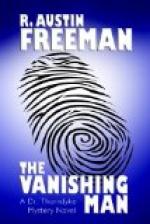“Then why is he applying for a presumption of death?”
“Just what I asked him. He says that it is the correct thing to do; that the entire responsibility rests on the Court.”
“That is all nonsense,” said Thorndyke. “Jellicoe is the trustee for his absent client, and, if he thinks that client is alive, it is his duty to keep the estate intact; and he knows that perfectly well. We may take it that Jellicoe is of the same opinion as I am: that John Bellingham is dead.”
“Still,” I urged, “men do disappear from time to time, and turn up again after years of absence.”
“Yes, but for a definite reason. Either they are irresponsible vagabonds who take this way of shuffling off their responsibilities, or they are men who have been caught in a net of distasteful circumstances. For instance, a civil servant or a solicitor or a tradesman finds himself bound for life to a locality and an occupation of intolerable monotony. Perhaps he has an ill-tempered wife, who, after the amiable fashion of a certain type of woman, thinking that her husband is pinned down without a chance of escape, gives a free rein to her temper. The man puts up with it for years, but at last it becomes unbearable. Then he suddenly disappears; and small blame to him. But this was not Bellingham’s case. He was a wealthy bachelor with an engrossing interest in life, free to go whither he would and to do whatsoever he wished. Why should he disappear? The thing is incredible.
“As to his having lost his memory and remained unidentified, that, also, is incredible in the case of a man who had visiting-cards and letters in his pocket, whose linen was marked, and who was being inquired for everywhere by the police. As to his being in prison, we may dismiss that possibility, inasmuch as a prisoner, both before and after conviction, would have full opportunity of communicating with his friends.
“The second possibility, that he may have died suddenly and been buried without identification, is highly improbable; but, as it is conceivable that the body might have been robbed and the means of identification thus lost, it remains as a possibility that has to be considered, remote as it is.
“The third hypothesis, that he may have been murdered by some unknown person, is, under the circumstances, not wildly improbable; but, as the police were on the look out and a detailed description of the missing man’s person was published in the papers, it would involve the complete concealment of the body. But this would exclude the most probable form of the crime—the casual robbery with violence. It is therefore possible, but highly improbable.




